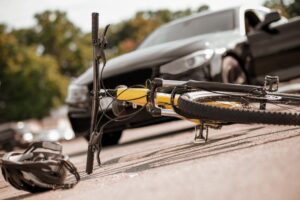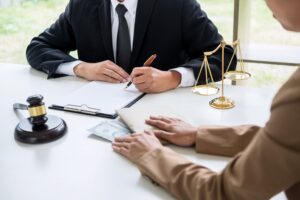If you have been injured in a cycling accident, you may be wondering what to do next. This guide sets out the steps you should follow after being in an accident on your bicycle, including seeking proper medical attention, reporting a cycling accident to the police and gathering evidence to support your case should you wish to make a compensation claim.
We begin this guide by discussing when you should report a cycling accident to the police and what information they may ask you to provide them. Following this, we will discuss when you could be eligible to make a personal injury compensation claim following a cycling accident and the evidence you could gather to help support your chances of claiming compensation.
This guide also discusses the importance of receiving medical attention and obtaining the details of the other party involved in the accident. The last section of this guide discusses how one of the road traffic accident solicitors on our panel could help you through the claiming process on a No Win No Fee basis and the benefits that come with this.
To learn more about reporting your cycle accident to the police or to find out more about the eligibility criteria for cycle accident claims, contact our dedicated and friendly advisors today via the following contact details:
- Call an advisor on 0161 696 9865
- Contact us through our website to receive a callback.
- Use the live chat feature in the bottom left of your screen to ask a question.
Browse This Guide
- Reporting A Cycling Accident To The Police Explained
- What Evidence Do I Need To Make A Cycling Accident Claim?
- Seek Medical Care For Your Cycling Accident Injuries
- Get The Other Party’s Details Following A Cycling Accident
- Can I Make A No Win No Fee Claim After Reporting A Cycling Accident To The Police?
- Learn More About Road Traffic Accident Claims
Reporting A Cycling Accident To The Police Explained
As per Rule 204 of the Highway Code, cyclists are classed as road users requiring extra care. This is due to the fact that cyclists are much less well-protected than drivers, and therefore, a cyclist hit by a car is at much greater risk of serious injury than the driver of a motor vehicle.
Reporting a cycling accident to the police helps them and the government become aware of such incidents and can enable them to enact better safeguarding measures to help protect cyclists. Additionally, reporting your cycling accident to the police means that they can take appropriate action regarding the incident.
If officers have been called to the scene, a police report can be made in person immediately after the accident. Alternatively, you can file a report later at the police station or online on your regional police department’s website. This should be done within 24 hours. Following making this report, you will be provided a police incident number.
Making a police report can also help support you when making a personal injury claim, as it can include crucial information regarding the incident. Later in this guide, we will discuss when you may be able to make a cycling accident claim.
What Information Will Be In Your Police Report?
A police report is a formal record of an incident that provides an objective account of the accident that took place. Police reports for cycling accidents may include information such as:
- Personal details of the parties involved: name, contact information, address and insurance details.
- Date, time and location of the accident.
- The make and model of vehicles involved.
- Weather conditions at the time of the accident.
- Details of the scene, such as tire marks, debris and other indicators of how the accident occurred.
- Witness statements and photographs of the scene may also be included.
For further guidance on what to do after a cycling accident, or to find out more about making road traffic accident claims, speak to our advisors using the information provided above.
What Evidence Do I Need To Make A Cycling Accident Claim?
As aforementioned, if you have been injured as a cyclist, you may be able to claim compensation. While on the road, you and other road users have a duty of care to navigate the roads responsibly and in a manner the prevents causing damage and harm to yourself and others. Additionally, all users of the road must adhere to the rules set out for them within the Highway Code and the Road Traffic Act 1988.
If your injuries were caused by another user of the road failing to adhere to their duty of care, you could be eligible to make a personal injury claim.
Cyclist claims against motorists following road traffic accidents will require the submission of supporting evidence. This evidence will show the extent of your injuries and their effects on you, as well as demonstrate the fault of the third party.
Examples of evidence you could use include:
- As previously aforementioned, the police report. This will contain information regarding the accident.
- Any CCTV, dashcam or helmet footage of the accident taking place.
- Photographs of your injuries, the accident scene and damage to your bicycle.
- Medical evidence regarding the injuries sustained, such as your medical records. We look at this in more depth in the next section.
For further guidance on the evidence that can be used when claiming for cycling accidents, call our advisors today at the number provided at the top of this page.
Seek Medical Care For Your Cycling Accident Injuries
Seeking professional medical help is always advisable following any accident. Even if you believe your injuries are minor or you were unharmed in the accident, it’s worth getting checked over by a medical professional. For example, a concussion may not be immediately obvious, but if left untreated could pose a serious risk to your health. Depending on the severity of your injuries, you may go to Accident & Emergency (A&E) or make an appointment with your GP.
As well as looking after your health, the medical records from your treatment will be key evidence in any personal injury claim as they will show what injuries you sustained and what treatment you received for them and will continue to need going forward. This medical evidence could then be used by those valuing your claim to help determine how much compensation you could be owed.
Our friendly and dedicated team of advisors can provide more advice on how gathering medical evidence and reporting a cycling accident to the police could help support you when making a personal injury claim. Contact us today using the information provided below.
Get The Other Party’s Details Following A Cycling Accident
It is very important to exchange details with the other parties involved in a road traffic accident. This information will help identify the parties involved. Get the insurance details, name, and contact information of the other road users. You should also note down the registration number, make, and model of the vehicles involved in the accident.
If a driver or one of the drivers has left the scene in a hit and run incident, this should be included in the police report. If you can, make a note of their registration number and details of their vehicle. The police will use this information to identify and track down the driver.
To learn about making a claim as an injured cyclist involved in a hit and run accident, you can contact our advisory team.
Can I Make A No Win No Fee Claim After Reporting A Cycling Accident To The Police?
After reporting a cycling accident to the police, you could contact our advisors for advice on what steps you could take towards making a personal injury claim. If they deem you to have a strong claim, they could put you in contact with a personal injury solicitor on our panel.
Our panel of solicitors have lots of experience working on a variety of road traffic accident claims, including those for cycling accidents. Furthermore, of one of them agrees to take on your claim, they may offer to represent you under a Conditional Fee Agreement.
Claiming with a solicitor through this type of No Win No Fee arrangement comes with various benefits, including:
- Nothing to pay upfront for the solicitor to begin working on the claim.
- No service fees to pay while the claim moves forward.
- Nothing to pay for the solicitor’s completed work if the claim is a failure.
If the solicitor wins the case, you will receive compensation. Your solicitor will take a percentage of this compensation as their success fee. The law limits how much can be taken as this percentage.
To learn more about making a police report following a cycling accident or to check your eligibility to claim compensation in your particular circumstances, contact our advisors today using the following contact details:
- Call an advisor on 0161 696 9865
- You can contact us online to receive a callback.
- Use the live chat feature in the bottom left of your screen to ask a question.
Learn More About Road Traffic Accident Claims
You can learn more about road traffic claims by reading some of our other guides:
- Learn if you could claim for a car accident caused by mud on the road with this guide.
- Find out more about making bus accident claims here.
- If you have been in a pedestrian car accident, you could be entitled to compensation. See this guide for more information.
We have also included these external resources for additional information:
- The police have published this guidance on collisions and incidents on their website.
- Following a cycling accident, your injuries may require you to take time off work to recover. You can learn more about claiming Statutory Sick Pay on the Government Website.
- The NHS has provided this extensive resource on providing First Aid after an incident.
Thank you for reading this guide on reporting a cycling accident to the police. For further advice on how reporting such an incident could help support you when making a personal injury claim, you can contact our advisors.




